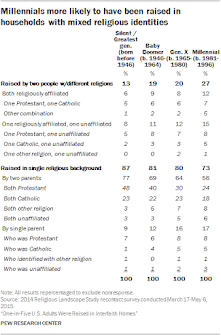Verses 4-8 often get read at weddings--in real life and on many, many television episodes:
Love is kind...Did Paul have any idea that he was preparing the wedding sermon to surpass all wedding sermons? What is Paul saying? In context?
In context, Paul is discussing spiritual gifts. I'm going to skip forward to Chapter 14 and then skip back.
Paul begins Chapter 14 with his opinion about speaking in tongues. As nicely as he can, he allows that a person speaking in tongues in a church meeting might actually be speaking in tongues (not, ehem, showing off) but, well, it doesn't do much good, does it, if the spoken part of the equation isn't interpreted?
At one point, he states, "For he that speaketh in an unknown tongue speaketh not until men, but until God" (2). Two verses later, he gives himself away by stating, "He that speaketh in an unknown tongue edifieth himself" (4).
Keep in mind, Paul is dictating his letter out loud--his next arguments could be used in a debate about deconstructionalism and art:
Any sound can be pleasing but if it doesn't have some order, it's just sounds. And what's the point if there's no audience? There's no meeting of the minds here.
Besides, I know more languages than you folks. (Seriously, he says this--the reason I love Paul.)
But when I come to visit, I won't show off. I'll speak so you understand me.
Don't act like kids! Okay, actually, when it comes to being jerks (like suing people), you should be ready to forgive the way kids do--but when it comes to instructing others, use your heads!
And besides, this speaking in tongues business makes us look nuts to others.
So...
Here is where the problem-solver in Paul comes out:
If you are going to speak in tongues, make sure there's an interpreter handy. Otherwise, be quiet.
Then Paul starts talking about women being silent in church.
Here is another reason I advocate context when reading the scriptures. Pull that scripture out of context and it looks downright strange since Paul had great relationships with women and commends them in other places/letters as church leaders.
 It helps to realize (1) Paul is talking to a specific group of people about a specific problem; (2) Paul never indicates even remotely that he thinks he is speaking for some collective ideological power-base called "Christianity"; (3) Corinthians weren't Jews.
It helps to realize (1) Paul is talking to a specific group of people about a specific problem; (2) Paul never indicates even remotely that he thinks he is speaking for some collective ideological power-base called "Christianity"; (3) Corinthians weren't Jews.
Paul was dealing with a population that he understood but likely didn't entirely empathize with, namely a population that brought its Greek/Roman/Egyptian beliefs and practices into Christianity (a normal tendency when people switch religions/cultures!).
The link between random people getting up and pronouncing complicated sounds (likely, magical spells--not in the "I'm going to curse you" sense but in the "repeat the spell for protection" sense) and women doing....something...indicates that while Paul could "translate" certain pagan rituals into Jewish/Christian terms, he had no idea what to do with Dionysian/Eleusinian rituals whereby women tore their clothes and danced wildly about and basically acted like teenagers at a dance club.
Paul wasn't prepared for mosh pits.
His answer: Just stop doing it.
Offended people often miss that Paul then goes after the speaking men: You think you're hot stuff, guys. You're not. God is in charge, remember?
So, "Therefore, my brothers and sisters, be eager to prophesy, and do not forbid speaking in tongues" (30, my emphasis).
It is quite amazing how often Paul comes down on the side of "let things alone."
Skipping back to Chapter 12, in sum, Paul states, There are lots of spiritual gifts. They aren't all the same. But they all of manifestations of God's grace.He then produces the remarkable analogy of members being one body made of distinct parts. Yeah, sure, some parts stand out more, but every part is useful and has purpose.
Chapter 13 is sandwiched between these two chapters.
Chapter 13:4-8 is beautiful and deserves to be quoted in full. I use the King James Version. However, I replaced "charity" with "magnanimity."
Many translations use "love," but "love" is off the mark as well. The Greek is
agape. It is bigger than
charity (as charity has come to mean) and bigger than romantic love although in many ways, in fairness to the wedding sermon approach, romantic love comes closer. It is unconditional, directed at God and humans, unfettered by doubt, all-encompassing.
 Magnanimity suffers long and is kind; magnanimity does not envy; magnanimity does not parade itself, is not puffed up; does not behave rudely, does not seek its own, is not provoked, thinks no evil; does not rejoice in iniquity, but rejoices in the truth; bears all things, believes all things, hopes all things, endures all things. Magnanimity never fails.
Magnanimity suffers long and is kind; magnanimity does not envy; magnanimity does not parade itself, is not puffed up; does not behave rudely, does not seek its own, is not provoked, thinks no evil; does not rejoice in iniquity, but rejoices in the truth; bears all things, believes all things, hopes all things, endures all things. Magnanimity never fails.
It is no error that Paul goes on to discuss imperfection, or, as the New International Version correctly translates, incompleteness. Paul is well-aware that agape is a big, big, big demand.
For we know in part and we prophesy in part. But when that which is perfect [complete] has come, then that which is in part will be done away. When I was a child, I spoke as a child, I understood as a child, I thought as a child; but when I became a man, I put away childish things. For now we see in a mirror, darkly, but then face to face. Now I know in part, but then I shall know just as I also am known.
If Paul wasn't wandering about a room, talking out loud, this chapter would end the argument. But he is thinking through the problem, so it comes in the middle. Yet it addresses all three chapters' underlying point:
But whether there are prophecies, they will fail; whether there are
tongues, they will cease; whether there is knowledge, it will vanish
away.
And now abide faith, hope, magnanimity, these three; but the greatest of these is magnanimity.
In sum, in more than one place, Paul creates policies, only to wipe them out in a single gesture or phrase. Here's how to run the church, but you know what...
I think in the end, that is so much dross. What really matters is that nothing is perfect now, so being cool with that imperfection through the application of magnanimity is a good idea. In other words, stop fussing so much about how other people messed up, making me write letters about all your fussing.
Hence the passage from 1 Corinthians 3:10-13 that I seldom encounter from any organization but deserves to be considered in full--keep in mind, Paul is cross because congregations are splitting into factions supposedly based on ideological arguments but truly based on high school cliquey behavior (I was baptized by so-and-so):
According to the grace of God which is given unto me, as a wise masterbuilder, I have laid the foundation, and another buildeth thereon. But let every man take heed how he buildeth thereupon. For other foundation can no man lay than that is laid, which is Jesus Christ. Now if any man build upon this foundation gold, silver, precious stones, wood, hay, stubble, every man's work shall be made manifest: for the day shall declare it, because it shall be revealed by fire; and the fire shall try every man's work of what sort it is. If any man's work abide which he hath built thereupon, he shall receive a reward. If any man's work shall be burned, he shall suffer loss: but he himself shall be saved; yet so [also] as by fire. (My emphasis.)
If Paul came right out and stated, Every church thinks it is the bee's knees. And maybe it is. Oh, well, God will find out 'cause that is God's job. But God also looks after the individual. So concentrate on your foundation and stop bugging other people about theirs. And, really, stop complaining to me about it--
He couldn't be more clear.
 On Votaries today, I wrote about dissenters and atheists.
On Votaries today, I wrote about dissenters and atheists. 







































